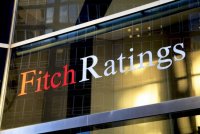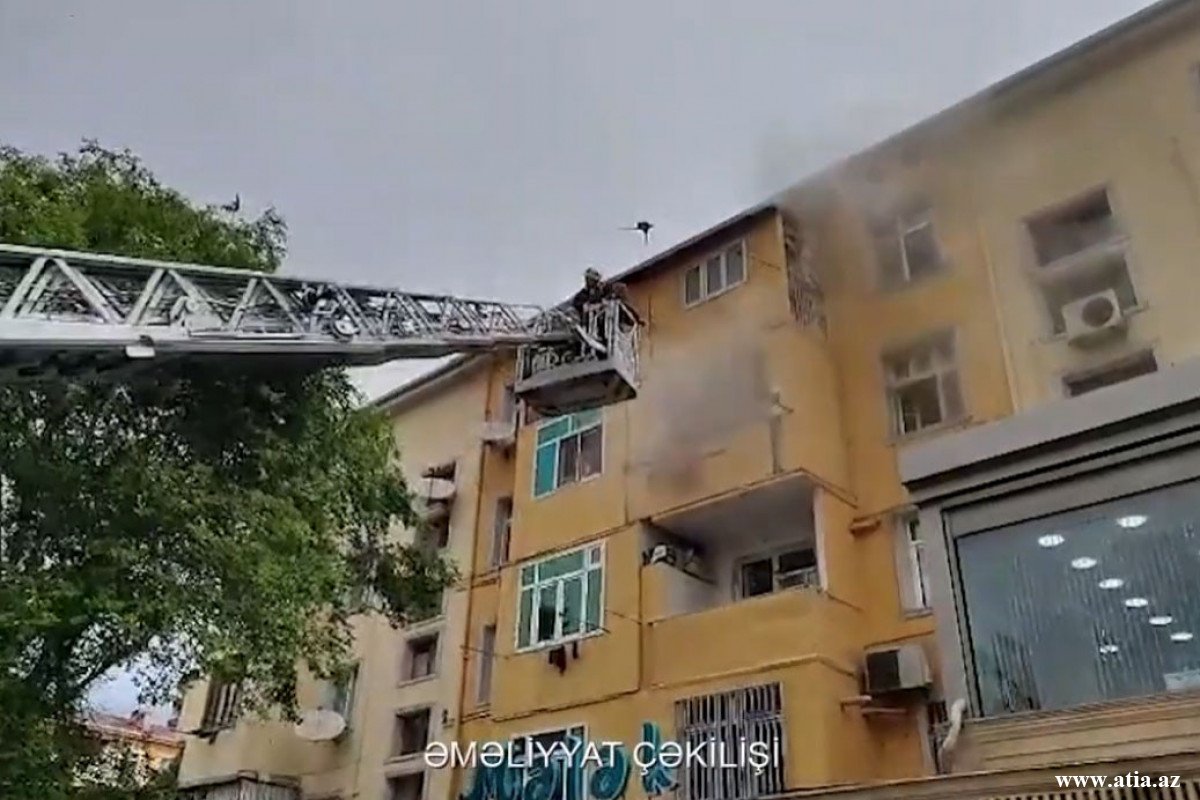 “Fitch” beynəlxalq reytinq agentliyi Azərbaycanın uzunmüddətli xarici valyutada defolt reytinqini (IDR) “BB+” səviyyəsində təsdiqləyib.
“Fitch” beynəlxalq reytinq agentliyi Azərbaycanın uzunmüddətli xarici valyutada defolt reytinqini (IDR) “BB+” səviyyəsində təsdiqləyib.
Agentliyin yaydığı məlumata görə, reytinq üzrə proqnoz "Mənfi"dir.
"Bu reytinq Azərbaycanın yüksək neft gəlirlərindən asılılığını, məzənnə rejiminin proqnozlaşdırılması və müəyyən edilməsi baxımından əskikliyin olmasını, güclü suverenliyini, Azərbaycan Dövlət Neft Fondunun (ARDNF) aktivlərinin fiskal maliyyə əsnəkliyinə malik olmasını özündə əks etdirir. Reytinq üzrə proqnoz isə qlobal neft qiymətlərinin yaxın müddətdə özünü bərpa etməsinin naməlum olmasını, koronavirus pandemiyasının potensial ikinci dalğasının Azərbaycanın xarici buferləri və uzunmüddətli risklərinin nizamsız makroiqtisadi idarəetməyə təsirini əhatə edir", - deyə "Fitch" bəyan edib.
Fitch Affirms Azerbaijan at 'BB+'; Outlook Negative
Fitch Ratings has affirmed Azerbaijan's Long-Term Foreign-Currency Issuer Default Rating (IDR) at 'BB+' with a Negative Outlook. A full list of rating actions is at the end of this rating action commentary.
KEY RATING DRIVERS
Azerbaijan's 'BB+' IDRs balance very strong sovereign and external balance sheets and fiscal financing flexibility from large sovereign wealth fund (SOFAZ) assets against a high dependence on oil revenues, weak governance indicators and lack of predictability and transparency of policy-making, especially in relation to the exchange rate regime.
The Negative Outlook reflects risks from the coronavirus shock, including near-term uncertainty about the recovery of global oil prices and the potential impact of the second wave of COVID-19 on Azerbaijan's external buffers and lingering risks of a disorderly macroeconomic adjustment. While the recent resolution of the conflict with Armenia in Nagorno-Karabakh and the surrounding regions is positive, in Fitch's view there remains the risk of flare-ups in tensions and uncertainty around the impact of Azerbaijan's regional spending plans on its public finances.
External pressures that saw a USD 2.5 billion drawdown in foreign exchange holdings of SOFAZ in March-April 2020 due to the combined shock from the slump in oil prices and the COVID-19 pandemic have eased significantly. Net demand for FX since then has been relatively stable, even during the recent escalation of the military conflict with Armenia over Nagorno-Karabakh and its surrounding regions.
The current pace of FX sales by the state oil fund SOFAZ is consistent with the authorities' revised budget plan for 2020 announced last August and sufficient to maintain the fixed exchange rate at 1.7 AZN/USD. Under Fitch's baseline assumption of gradually rising oil prices in 2021 and 2022, risks of a disorderly devaluation remain low. Nevertheless, the ongoing second wave of COVID-19 infections increases downside risks to the outlook.
The revised budget increased SOFAZ's authorised transfers to the state budget for 2020 and capacity for FX sales, by USD500 million in total, providing greater support to the fixed exchange rate. SOFAZ foreign exchange sales for the year through October amounted to USD6.2 billion. The strong recovery of international financial markets after a sharp correction in March 2020 and a strong rally in gold prices have also resulted in robust asset management returns for SOFAZ's portfolio, almost offsetting, at least for now, the fall in oil revenues and increase in budget transfers. By end-September 2020, total assets at SOFAZ had fallen by just 0.1%. We forecast external assets to total USD49.8 billion at end-2020 (31 months of current external payments; CXP), down from USD50.4 billion (28 months of CXP) at end-2019.
Fitch projects the current account deficit at 1.4% of GDP for 2020 on current oil price assumptions. We forecast the current account returns to a surplus of 3.8% in 2021 and 4.9% in 2022, and supplemented by roughly 2pp of GDP in FDI from hydrocarbon expansion projects.
The recent escalation of armed conflict in Nagorno-Karabakh appears to be drawing to a close with a ceasefire brokered by Russia, but we consider there is a downside risk of resumption of hostilities over time. Fighting had intensified since September, but the impact on official Azerbaijan GDP, which excludes activity in the region, has been limited. The Azerbaijan government has announced intentions to significantly increase infrastructure investments in the region.
Fiscal and external buffers are strengths relative to 'BB' medians. Gross government debt is forecast to stay very low at 23% of GDP at end-2020 (current 'BB' median of 60%), rising only slightly given financing of the fiscal deficit from SOFAZ assets. Government on-lending and guarantee contingent liabilities were 31% of GDP as of end-3Q19 and accrue to the large state-owned bank International Bank of Azerbaijan's (IBA; B-/Stable) debt restructuring in 2017 and to gas investment projects. Low oil production break-even prices averaging roughly USD15/b moderates contingent liability risk from the state-oil company (SOCAR), but large FX mismatches at SOCAR are a source of vulnerability.
We forecast a consolidated fiscal deficit of 5.7% of GDP for 2020. The revised 2020 budget increased the government's fiscal deficit forecast to 10.9% of GDP for 2020 assuming average oil prices of USD35/b, due to a 21% fall in oil revenues and a 3% rise in expenditures relative to the original 2020 budget. Our smaller deficit forecast reflects roughly 3.8pp of GDP in SOFAZ asset management gains and slightly higher average oil prices of USD40/b.
We forecast the consolidated fiscal deficit to fall only slightly to 4.4% of GDP in 2021 and to 1.1% in 2022 as oil prices and economic growth recover only gradually. We assume 0.6pp of GDP in increased capital expenditure in 2021 and 2022 for post-conflict rebuilding in the Nagorno-Karabakh and surrounding regions, with greater clarity around the scale of this project expected to materialise with the 2021 budget in the coming weeks. We also expect plans for the renewing of currently suspended fiscal rules to be published along with the budget.
In our view, the lack of predictability and transparency of policy-making, especially in relation to the exchange rate regime, raises the risk of policy missteps and disruptive policy adjustments in response to crises, as was the case during the 2014-15 oil price shock. Deposit dollarisation has moderated to 59% of deposits at end-August 2020, from 61% at end-2019, while loan dollarisation fell to 32% of loans from 35%, but both remain high and above their pre-2014 levels.
Public health restrictions to contain a second wave of COVID-19 infections, which is now ongoing, have been steadily tightened in November 2020 and are due to last until end-2020, including suspension of non-essential businesses on weekends and suspension of public transport. Fitch forecasts real GDP growth to contract by 4.3% in 2020 due to public health restrictions, the slump in oil prices and OPEC+ production cuts, before recovering to 2.7% and 2.0% in 2021-2022. The oil production cuts are currently planned to be tapered from January 2021 but could be extended into 1Q21. Announced anti-crisis support measures to households and businesses are relatively small at 3.1% of GDP in 2020.
Azerbaijan is highly reliant on the oil sector with hydrocarbons accounting for roughly 40% of GDP, 90% of exports, and two-thirds of fiscal revenues. Structural rigidities and intangible impediments to competition limit its strong improvement in doing business indicators from translating into significant non-oil FDI to diversify the economy away from hydrocarbons.
Azerbaijan banks' asset quality will be pressured by the impact of COVID-19 and lower oil prices. Non-performing loans fell slightly to 7.2% of loans at end-September 2020 from 8.3% at end-2019, continuing to benefit from government social support schemes to households from 2019. Fitch expects problem loans to increase to above 10% in 2021 as part of the loans, which were restructured due to the pandemic, may become overdue. Banks are weak as reflected by Fitch's Banking System Indicator (BSI) score of 'b'. IBA has returned to profitability with large capital buffers and improved asset quality since its 2017 debt restructuring, but continues to have an unhedged open currency position of USD0.7 billion in June 2020 (2017: USD1.9 billion).
ESG
ESG - Governance: Azerbaijan has an ESG Relevance Score (RS) of 5 for both Political Stability and Rights and for the Rule of Law, Institutional and Regulatory Quality and Control of Corruption, as is the case for all sovereigns. Theses scores reflect the high weight that the World Bank Governance Indicators (WBGI) have in our proprietary Sovereign Rating Model. Azerbaijan has a low WBGI ranking at 28 percentile, reflecting very poor voice and accountability, relatively weak rights for participation in the political process, uneven application of the rule of law and a high level of corruption.
RATING SENSITIVITIES
The main factors that could, individually or collectively, lead to negative rating action/downgrade:
- Macro: Developments in the economic policy framework that undermine macroeconomic stability, such as the rapid erosion of the sovereign's external balance sheet or disorderly devaluation of the manat exchange rate.
- External Finances: Sustained low oil prices or a prolonged external shock sufficient to have a material negative impact on the external position, with resulting adverse effects on the economy, banking sector, and public finances.
The main factors that could, individually or collectively, lead to positive rating action/upgrade are:
- External Finances: Increased likelihood an enduring easing of external pressures, e.g. due to a sustained recovery in oil prices, that reduce the potential of a disorderly devaluation of the exchange rate.
- Public Finances: Confidence in the government's ability to reduce the consolidated fiscal deficit and preserve government liquid/financial assets and low government debt/GDP beyond the COVID-19 shock.
- Macro: Improvement in the macroeconomic policy framework, including transparency of exchange rate policy, that strengthens the country's ability to address external shocks and reduces macro volatility.
SOVEREIGN RATING MODEL (SRM) AND QUALITATIVE OVERLAY (QO)
Fitch's proprietary SRM assigns Azerbaijan a score equivalent to a rating of 'BB' on the Long-Term Foreign-Currency (LT FC) IDR scale.
Fitch's sovereign rating committee adjusted the output from the SRM to arrive at the final LT FC IDR by applying its QO, relative to SRM data and output, as follows:
- External Finances: +1 notch, to reflect large SOFAZ assets, which underpin Azerbaijan's exceptionally strong foreign currency liquidity position and the very large net external credit position of the country.
Fitch's SRM is the agency's proprietary multiple regression rating model that employs 18 variables based on three-year centred averages, including one year of forecasts, to produce a score equivalent to a LT FC IDR. Fitch's QO is a forward-looking qualitative framework designed to allow for adjustment to the SRM output to assign the final rating, reflecting factors within our criteria that are not fully quantifiable and/or not fully reflected in the SRM.
BEST/WORST CASE RATING SCENARIO
International scale credit ratings of Sovereigns, Public Finance and Infrastructure issuers have a best-case rating upgrade scenario (defined as the 99th percentile of rating transitions, measured in a positive direction) of three notches over a three-year rating horizon; and a worst-case rating downgrade scenario (defined as the 99th percentile of rating transitions, measured in a negative direction) of three notches over three years. The complete span of best- and worst-case scenario credit ratings for all rating categories ranges from 'AAA' to 'D'. Best- and worst-case scenario credit ratings are based on historical performance. For more information about the methodology used to determine sector-specific best- and worst-case scenario credit ratings, visit [https://www.fitchratings.com/site/re/10111579].
KEY ASSUMPTIONS
Fitch forecasts Brent Crude to average USD40.0/b in 2020, USD45/b in 2021 and USD 50/b in 2022.
Fitch assumes that Azerbaijan will continue to experience broad social, political, economic, and financial stability, and that the recent ceasefire will avert a renewed and prolonged escalation in the conflict with Armenia over Nagorno-Karabakh.
Report, Fitch
Bölməyə aid digər xəbərlər

























